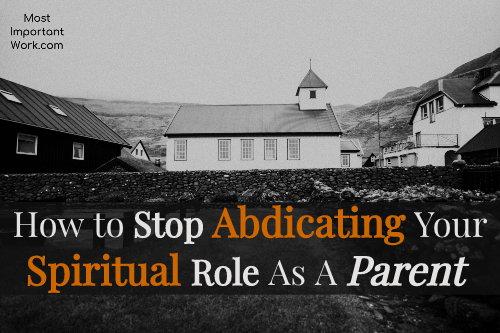
How to Stop Abdicating Your Spiritual Role as A Parent
Reading Time: 5 min 40 sec
As Christian parents we all want our children to grow up to know and love God. We want them to behave well, get good grades, and live a moral life. We believe that if we can only keep them in a church, they will develop a faith that will keep them from drugs, teenage pregnancy, and overall bad decisions.
We quickly fall into the trap of believing that it is the primary role of churches to develop the spiritual lives of our kids. Our feelings of inadequacy and perceived lack of time and energy drive us to make sure our children are being taught about God from the professionals.
So we jump from church to church desperately trying to find a children’s program or youth group where our child can truly connect. We find safety in the belief that our role begins and ends with a ride to church and money for summer camp.
This mindset is doing a great disservice to our families. Studies have shown year after year that parents, (not youth pastors) are the number one influence in the lives of their children.
As a former youth pastor, let me be completely honest with you, it is impossible for pastors to raise children to know and love God because we only have them for an one maybe two hours a week.
There is a reason why God encourages us as parents to take a primary role in the spiritual life of our children. “Start children off on the way they should go, and even when they are old they will not turn from it.” Proverbs 22:6 A life with God is modeled for kids by their parents, who live life with them.
The church still plays a crucial role in the spiritual development of your child. However, it was not meant to serve as the primary spiritual influence in their lives.
So how with all of our misgivings, inadequacies, failures, and humanness do we raise our children to know and love God?
We are going to be talking about three ways that we parents can serve as the primary spiritual influence in the lives of our children.
1. A With God Life
2. You Are Not Alone
3. Take A Breath

1. A With God Life
I was engaged in small talk at a birthday party, when another mother interjected, “Oh, my. Now I know where your children get it.” I looked at her puzzled, “Get what?” I ask. “Their manner of speech. They sound just like you.”
As parents, whether we like it or not, our children pick up not only our mannerisms, but our outlook on life. When we make our relationship with God a priority it sends the message (louder than all our rants) that God is to be taken seriously.
Your actions literally speak louder than your words. When you make the choice to spend time with God, to pray, to wrestle with real-life problems with God in front of your children, you are helping to set the foundation for their spiritual development.
In Deuteronomy 6:6-9, Moses tells the Israelites to, “Write these commandments that I’ve given you today on your hearts. Get them inside of you and then get them inside your children. Talk about them wherever you are, sitting at home or walking in the street; talk about them from the time you get up in the morning to when you fall into bed at night. Tie them on your hands and foreheads as a reminder; inscribe them on the doorposts of your homes and on your city gates.”
When a life with God is a priority, not an afterthought, not something we work in into the margins of our lives, our children sit up and take notice. When you live your relationship with God in front of them, you are giving them tools for the rest of their lives.
This can be as simple as natural conversations about God. Apologizing when you have blown it. And treating your spouse with respect. Our children need us to care and invest in our own spiritual development. Our life with God speaks louder than all the sermons in the world. Trust me, I should know. ![]()
2. You Are Not Alone
Okay, before those feelings of discouragement and pressure threaten to overwhelm you know that you are not alone in this parenting journey. You don’t have to have all the answers (it’s better if you don’t). Woohoo!
God has given us the gift of the Holy Spirit. When we don’t even know that our child is struggling, he does. He knows exactly what our children need and when they need it. Our job is to partner with the Holy Spirit in inviting our children into a life with God. He is the one who works in their hearts as they come to know God.
“As they are ready, children construct or form their understandings for themselves, with the gracious presence, encouragement, and guidance of God’s Spirit.” Catherine Stonehouse and Scottie May, Listening to Children on the Spiritual Journey.
So how do we partner with God? We can do this by creating elbow room for the Holy Spirit to move. We can create opportunities by slowing down and inviting Gods to speak to our hearts, through prayer, quiet, conversation, and reflection.
3. Take A Breath
As parents, we need to understand that children learn by experience, not data. As much as we would like to fill their head with all these facts about God, they need to experience the lavish love of the Father, in order to have a living breathing relationship with him.

And so, the phrase, “Just because I said so” doesn’t work in the spiritual formation of your child. We need to allow them to wrestle with real-life issues. Information about God and the Bible is an important part of our faith. However, at this stage in their spiritual journey, experience is how they encounter a relationship with God.
“Children are most like adults in their feelings. They are least like adults in their thinking. More information does not make them think like us.” Catherine Stonehouse
When children have an actual relationship with God, they make decisions of faith. Here are some practical tips to create elbow room for the Holy Spirit to speak to your child.
1. When reading a Bible story or passage do not be quick to point out the moral. Allow your child space to think about the story. Trust that the Holy Spirit is planting seeds.
2. Model talking to God like a friend. Trusting him with the little and big stuff of life. All throughout the day. No deep voice required. ![]()
3. Spend some time in silence. Tell your child that you are going to spend some time being quiet and just spend time with God. Remind the children that he is present with them right now.
Pray and Invite God’s presence and allow for a short period of silence (start with a minute). Close with a short prayer.
Talk to your child about their experience. If they didn’t experience anything, let them know that it happens. Tell them that they brought God great joy by showing up to spend time with him.
4. Allow your child to interact with the story in a variety of ways. You can use toys, puppets, food, drama, books, and art etc.









































































